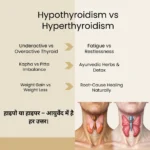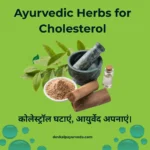Ayurvedic Treatment for High Cholesterol: Natural Ways to Balance Your Lipids
High cholesterol is a major contributor to cardiovascular disease, which remains one of the leading causes of death globally. Elevated cholesterol levels can silently damage your arteries over time, increasing the risk of heart attacks, strokes, and other serious health issues. While modern medicine typically recommends statins and other cholesterol-lowering drugs, Ayurveda provides a holistic, root-cause-oriented alternative. Ayurvedic treatment for high cholesterol is based on balancing the body’s internal energies, improving digestion, detoxifying the system, and strengthening metabolic pathways. This comprehensive approach not only helps reduce harmful cholesterol levels (LDL and triglycerides) but also enhances overall well-being.
Understanding Cholesterol and Its Impact on Health
Cholesterol is a waxy, fat-like substance found in your blood. Your body needs cholesterol to build healthy cells and produce essential hormones. However, too much cholesterol—especially low-density lipoprotein (LDL) cholesterol—can lead to fatty deposits in your blood vessels.
Types of Cholesterol:
- LDL (Low-Density Lipoprotein): Often called “bad cholesterol,” it contributes to plaque buildup in arteries.
- HDL (High-Density Lipoprotein): Known as “good cholesterol,” it helps remove LDL cholesterol from the bloodstream.
- Triglycerides: A type of fat in the blood. High levels can further increase the risk of heart disease.
Causes of High Cholesterol:
- Poor dietary habits (fried, sugary, and processed foods)
- Sedentary lifestyle
- Obesity
- Smoking and alcohol
- Genetics and underlying health conditions
Ayurvedic Perspective on High Cholesterol
In Ayurveda, high cholesterol is viewed as an imbalance in the body’s doshas (Vata, Pitta, and Kapha), particularly involving the accumulation of Meda Dhatu (fat tissue) and Ama (toxins). The condition is usually associated with excessive Kapha dosha and weak digestive fire (Agni).
Key Concepts:
- Meda Dhatu: Refers to the fat tissue in the body. When Meda is imbalanced, it leads to excessive fat storage and sluggish metabolism.
- Ama: Undigested or improperly metabolized material that clogs bodily channels and disrupts normal functions.
Ayurvedic treatment aims to:
- Strengthen Agni (digestive fire)
- Eliminate Ama (toxins)
- Balance Kapha dosha
- Improve fat metabolism
Ayurvedic Herbs for Managing Cholesterol
Ayurveda offers a wide range of herbs with lipid-lowering, detoxifying, and cardio-protective properties.
1. Guggul (Commiphora mukul)
- Primary herb for lowering LDL and triglycerides
- Supports thyroid function and metabolism
- Removes Ama and promotes fat digestion
2. Arjuna (Terminalia arjuna)
- Strengthens heart muscles
- Reduces arterial plaque
- Improves circulation and blood pressure regulation
3. Triphala
- A combination of three fruits: Amalaki, Haritaki, and Bibhitaki
- Promotes digestion and elimination
- Detoxifies liver and improves fat metabolism
How to Use Triphala Daily: Benefits and Dosage Guide
4. Amla (Emblica officinalis)
- Rich in antioxidants and vitamin C
- Regulates cholesterol synthesis in the liver
- Supports cardiovascular health
5. Garlic (Allium sativum)
- Lowers LDL cholesterol and triglycerides
- Prevents blood clot formation
- Enhances circulation
6. Ashwagandha
- Reduces stress-related hormonal imbalance
- Indirectly supports lipid balance
- Enhances energy and metabolism
Ayurvedic Diet Recommendations
A cholesterol-lowering diet in Ayurveda is primarily Kapha-pacifying: warm, light, and easy to digest.
Foods to Avoid:
- Deep-fried, oily, and processed foods
- Full-fat dairy products
- Red meat and preserved meats
- Sugary snacks and soft drinks
Foods to Include:
- Whole grains like barley, oats, and millets
- Green leafy vegetables
- Moong dal and lentils
- Spices such as turmeric, cumin, coriander, and black pepper
- Healthy fats like flaxseed and a moderate amount of ghee
Dietary Tips:
- Eat freshly prepared, warm meals
- Avoid overeating and late-night meals
- Drink warm water throughout the day
- Use herbal teas to support digestion
Lifestyle Modifications
Ayurveda places significant emphasis on daily routine (Dinacharya) and seasonal detoxification (Ritucharya) for preventing and managing chronic diseases like high cholesterol.
Key Lifestyle Changes:
- Wake up early and follow a consistent routine
- Practice yoga postures like Surya Namaskar, Ardha Matsyendrasana, and Vajrasana
- Engage in daily brisk walking or light exercise for at least 30 minutes
- Practice Pranayama and meditation to reduce stress
- Get adequate and regular sleep
Panchakarma for Cholesterol Management
Panchakarma is Ayurveda’s intensive detoxification protocol that removes deep-seated toxins and restores dosha balance.
Recommended Panchakarma Therapies:
- Virechana: Herbal purgation to eliminate excess Pitta and Ama
- Basti: Medicated enema to cleanse the colon and balance Vata
- Udwartana: Herbal powder massage to break down subcutaneous fat
These therapies must be done under the supervision of a trained Ayurvedic practitioner after proper assessment.
Panchakarma: Panchakarma Therapy for Detox and Rejuvenation
Home Remedies for Cholesterol Control
Honey and Lemon Water
- Mix 1 tsp honey and half a lemon in a glass of warm water
- Drink daily in the morning to promote fat metabolism
Guggul and Triphala
- Available as tablets or powders
- Take under medical guidance for best results
Amla Juice
- Take 20 ml with warm water every morning
- Improves liver function and cholesterol balance
Conclusion
Ayurvedic treatment for high cholesterol offers a comprehensive and sustainable alternative to conventional approaches. By addressing the root causes of lipid imbalance through herbal support, detoxification, dietary changes, and lifestyle modifications, Ayurveda helps in restoring cardiovascular health naturally.
If you’re struggling with high cholesterol, consult a qualified Ayurvedic practitioner to begin your personalized healing journey. With the right guidance and commitment, you can take charge of your heart health the Ayurvedic way.
Frequently Asked Questions (FAQs)
Guggul, Arjuna, and Triphala are considered the most effective Ayurvedic remedies for managing high cholesterol levels. Ayurveda addresses the root causes of high cholesterol through holistic lifestyle changes, detoxification, and herbal therapies. With consistent practice, it is possible to bring cholesterol levels back to balance naturally. Visible improvements can often be seen in 4 to 8 weeks, depending on the individual’s lifestyle, severity of the condition, and adherence to Ayurvedic recommendations. In moderation, ghee made from cow’s milk supports fat metabolism and is not harmful. However, overconsumption, especially in Kapha-dominant individuals, should be avoided. When used under expert supervision, Ayurvedic remedies are generally safe and well-tolerated. Self-medication without proper guidance is not recommended.


